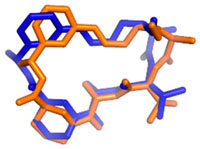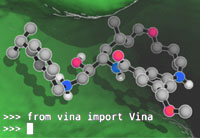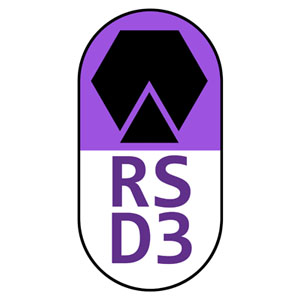RSD3 Services
Since the major product of this Resource is software, our overarching policy is the commitment to open source licensing and the widest possible dissemination of all RSD3 software, with licenses that are non-restrictive about modification or use and do not limit the scope of the Sustainability Plans toward commercialization. Use the links below to download easy installation packages of executables for major operating systems, documented APIs, and source-code libraries via Sourceforge and Github. We greatly appreciate acknowledgement of authors, relevant publication citations, and funding sources of the software, as noted within the pages for each software package.
Additional services are available in separate pages on the RSD3 website, including: TRAINING and COMMUNITY ASSISTANCE.

AutoDock-GPU
AutoDock-GPU is the fastest full-service docking engine available at RSD3. It is a version of AutoDock4.2.6 accelerated by OpenCL and Cuda. It leverages the embarrassingly-parallelizable Lamarckian Genetic Algorithm of AutoDock by processing ligand-receptor poses in parallel over multiple compute units.

Meeko
Meeko streamlines the processing of ligand coordinate files for use in docking. It reads an RDKit molecule object and writes a PDBQT string (or file) for AutoDock-Vina and AutoDock-GPU. It converts the docking output to RDKit molecules and SD files, without loss of bond orders.

AutoDock-Vina
AutoDock-Vina is one of the fastest and most widely used open-source docking engines. It is a turnkey computational docking program that is based on a simple scoring function and rapid gradient-optimization conformational search.
Please cite:
- Eberhardt, J., Santos-Martins, D., Tillack, A.F., Forli, S. (2021). AutoDock Vina 1.2.0: New Docking Methods, Expanded Force Field, and Python Bindings. Journal of Chemical Information and Modeling.
- Trott, O., & Olson, A. J. (2010). AutoDock Vina: improving the speed and accuracy of docking with a new scoring function, efficient optimization, and multithreading. Journal of computational chemistry, 31(2), 455-461.

Ringtail
Ringtail reads collections of Docking Log Files (DLG) or PDBQT results from virtual screenings performed with AutoDock-GPU and AutoDock-Vina, respectively, and deposits them into a SQLite database. It then allows for the filtering of results with numerous pre-defined filtering options, generation of a simple result scatterplot, export of molecule SDFs, and export of CSVs of result data. Result file parsing is parallelized across the user’s CPU.
Please cite:
- Hansel-Harris, A., Tillack, A., Santos-Martins, D., Holcomb, M., Forli, S. (2022) Ringtail: a Python tool for efficient management and storage of virtual screening results. ChemRxiv 10.26434/chemrxiv-2022-x9ztv

